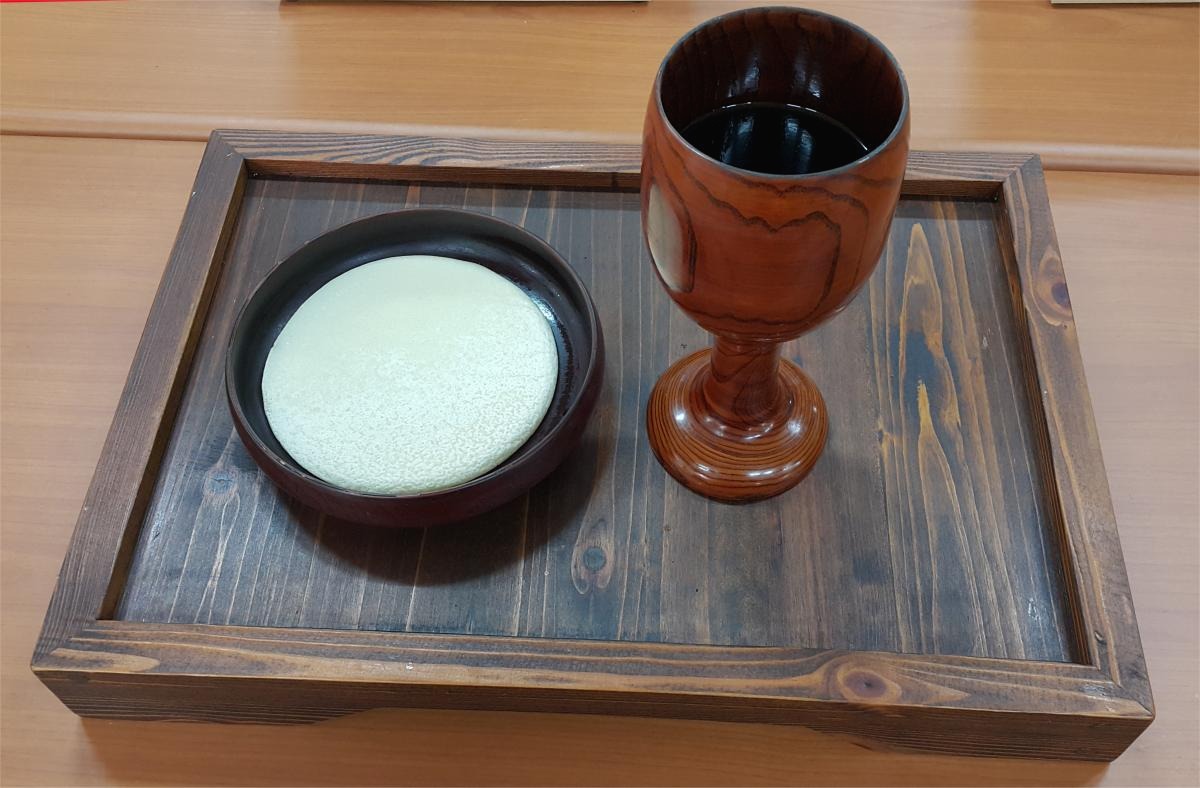|
Ephesians 5: Relationships and Responsibilities in Perspective 브루스 로저스 | |
|
Chapter five continues the theme of relationships and corresponding responsibilities. The first section (vv 1-21) is transitional from the spiritual sphere of the Body of Christ to the natural spheres of marriage (vv 22-33), family ( In the second section (vv 22-33), Christian husbands and wives are exhorted to manifest the beauty of love and respect, reflecting the pattern of the loving headship of Christ and respectful submission of the Church, His Body and Bride.
|
제5장은 관계와 일치하는 책임의 주제를 계속한다. 첫번째 부분(1-21절)은 그리스도의 몸된교회의 영적인 영역에서 결혼(22-33절), 가족( 두번째 부분에서는(22-33절), 그리스도인 남편들과 아내들은 사랑하고 존중하는 아름다움을 나타내기 위한 권고함이며, 그분의 몸과 신부는 그리스도의 머리 되심과 교회가 경외하고 복종하는 사랑의 본을 반영한다.
|
|
|
|
Reproof brings conviction of sin and potentially conversion. “Awake thou that sleepest ...” (v 14, possibly quoting Isaiah 60:1-2) may refer to the conversion of a pagan out of the carelessness and corruption of sin, as a result of the beneficial effect of the light shining upon him. If referring to a believer, it is a challenge to rouse up from spiritual complacency and complicity with the attitudes and behavior of those around him. In either case, the caution to “walk circumspectly” (v 15) applies equally well. It requires careful concentration and sober evaluation to live prudently and productively, making use of opportunities to further the Lord’s purposes, despite the predominance of evil in the world (vv 15-17). While not evil in itself, wine progressively impairs self-control and discernment, endangering us and others around us, both morally and physically. In contrast, the indwelling Spirit enhances joy, wisdom, and strength to suppress evil, as we yield to His influence. Are we “being filled with the Spirit” (v 18)?
|
책망은 죄에 관한 자각과 잠재적인 변화를 가져온다. “너 잠자는 자여 깨어서…”(14절, 아마 이사야 60:1-2을 인용)는 그분에게서 빛나는 빛의 유익한 효과의 결과로 경솔함과 죄의 타락으로 나타나는 이교도의 변화를 제시할 수도 있다. 신자에게 나타나는 경우 그것은 그분의 주위 사람들의 태도와 품행을 함께 영적인 자기 만족과 연루됨에서 눈을 뜨도록 도전한다. 어떤 경우에 “조심스럽게 걸어”(15절)에 대한 주의는 적절히 동일하게 적용한다. 그것은 세상에서 사악함의 지배에도 불구하고 주님의 목적을 진행하려는 기회를 활용한 주의 깊은 집중과 진지하고 생산적으로 살아가려는 냉정한 평가를 필요로 한다(15-17절). 사악함 그 자체가 아니라 할지라도 와인이 점점 우리의 주변에 우리와 다른 사람들을 위태롭게 하고 모두 도덕적으로 또한 육체적으로 자제력과 분별력을 손상한다. 대조적으로 내주하시는 성령은 우리가 그분의 영향력을 가져오기 때문에 기쁨, 지혜와 악을 누르는 능력을 강화한다. 우리는 “성령으로 충만되어” 있는가(18절)?
|
|
The following five dependent clauses (vv 19-21) reveal evidences of His influence. Meditation, praise, joy in the Lord, thankfulness to God as our Father in all our circumstances, and respectful consciousness of His presence also strengthen us to be good stewards of our relationships with one another, as implied in “submitting yourselves one to another” (v 21). Joyful submission to Christ prepares us to serve one another.
|
뒤를 잇는 5개의 종속적인 항목(19-21절)은 그분의 영향력을 드러낸다. 주님 안에 묵상, 찬양, 기쁨, 모든 우리의 환경에서 우리의 아버지로 하나님께 대한 감사와 그분의 임재를 의식한 경외함은, 또한 “경외함으로 피차 복종하라”(21절)고 함축되는 것과 같이 서로간에 우리의 관계에 관한 좋은 청지기가 되도록 우리를 강하게 한다. 그리스도께 대한 즐거운 복종은 서로를 섬기기 위한 우리를 세운다.
|
|
|
|
Husbands are called to reflect Christ’s headship of love (vv 25-29). While surpassing all comparison, key features are intentionally presented to give us incentive and perspective in our own marriages. Self-sacrifice is the undeniable proof of His love (v 25); sanctification is the undeviating purpose of His love (v 26), bringing us to perfect suitability as His eternally beautiful Bride - the undiminished prospect of His love (v 27). Another key feature introduced in verses 28-29 is love’s perception. Recognizing my wife as part of me honors the marital relationship as making us one, and establishes her as having priority over every other natural relationship and concern. Affectionate intimacy and instinctive care are mutually enjoyed, and emotional distancing and cruelty are abhorred. This again reflects the greater reality of His perception of us and provision for us as being part of Himself (v 30). The quotation (v 31) from Genesis 2 reveals that Eve’s formation from Adam’s flesh, and presentation to him as his bride, was deliberately designed to establish a pattern of permanent and exclusive oneness for male and female marital relationships. It also foreshadowed a greater reality and foundation for marriage: Christ the new head over a new creation, with the Church His Body and Bride (v 32). As husbands, are we reflecting His self-sacrificing love? As wives, are we manifesting respect?
|
남편은 사랑의 머리 되신 그리스도를 반영하기 위하여 부르심 받았다(25-29절). 모든 비교를 능가함과 동시에 주요한 특징은 우리의 자신의 결혼 안에서 동기유발과 균형을 우리에게 주기 위하여 의도적으로 나타내었다. 자기희생은 그분의 사랑의 명백한 증거이다(25); 거룩함은 그분의 사랑을 바라보는 쇠하지 않는 그분의 영원한 아름다운 신부로 완전하게 어울리도록 우리에게 가져오는(27절) 그분의 사랑의 목적을 벗어나지 않는 것이다(26절). 28-29절에서 소개된 또 다른 주요한 특징은 사랑의 인식이다. 우리에게 하나를 만들므로 나에게 결혼 관계의 특권의 부분으로 나의 아내를 인정하는 것과 다른 모든 자연적인 관계와 관심 위에 그녀가 우선권을 가짐을 확증한다. 애정관계와 본능적인 배려는 상호간에 즐기게 되고, 감정적인 멀어짐과 학대는 몹시 혐오한다. 이것은 다시 그분 자신의 일부분으로 우리를 위한 준비와 우리에 관한 그분의 지각의 더 큰 실재를 반영한다(30절). 창세기 2장에서 인용(31절)은 아담의 살에서 하와를 형성한 것을 드러낸다, 그리고 그의 신부로 그에게 대한 소개는 의도적으로 남성과 여성의 결혼관계에 대한 불변하고 배타적인 단일성의 본을 제정하도록 신중히 구성되었다. 그것은 또한 결혼을 위한 더 큰 실재와 기초를 예시했다: 그리스도는 새로운 창조 위에 새로운 머리, 교회와 더불어 그분의 몸된교회와 신부(32절). 남편으로서 우리는 그분의 자기 희생의 사랑을 반영하고 있는가? 아내로서 우리는 존중을 나타내고 있는가?
|
'말씀 안으로 > 에베소서' 카테고리의 다른 글
| 십계명과 에베소서 (0) | 2022.12.22 |
|---|---|
| 그리스도 안에 우리의 부(富)(1) (0) | 2016.03.01 |
| 그리스도 안에 우리의 부(富)(2) (0) | 2016.03.01 |
| 그리스도 안에 우리의 부(富)(3) (0) | 2016.03.01 |
| 에베소서 4: 우리를 부르심-그리스도 안에 우리의 걸음 (0) | 2016.03.01 |
| 에베소서6: 순종하는 아들, 종; 무장한 군인 (0) | 2016.03.01 |

